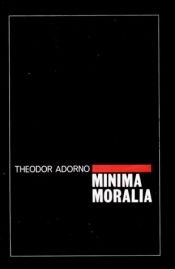Minima moralia. Refleksjoner fra det beskadigede livet
Blurb
Minima Moralia: Reflections From Damaged Life is a 1951 book by Theodor W. Adorno and a seminal text in Critical Theory. Adorno started writing it during World War II, in 1944, while he lived as an exile in America, and completed it in 1949. It was originally written for the fiftieth birthday of his friend and collaborator Max Horkheimer, who co-authored the book Dialectic of Enlightenment with Adorno.The book takes its title from Magna Moralia, Aristotle's lesser-known work on ethics. As Adorno writes in the Dedication, the "sorrowful science" with which the book is concerned is "the teaching of the good life", a central theme of both the Greek and Hebrew sources of Western philosophy. In the mid-20th century, Adorno maintains that a good, honest life is no longer possible, because we live in an inhuman society. "Life does not live", declares the book's opening epigram. Adorno illustrates this in a series of short reflections and aphorisms into which the book is broken, moving from everyday experiences to disturbing insights on general tendencies of late industrial society.

 English
English Español
Español Deutsch
Deutsch
Member Reviews Write your own review
Be the first person to review
Log in to comment